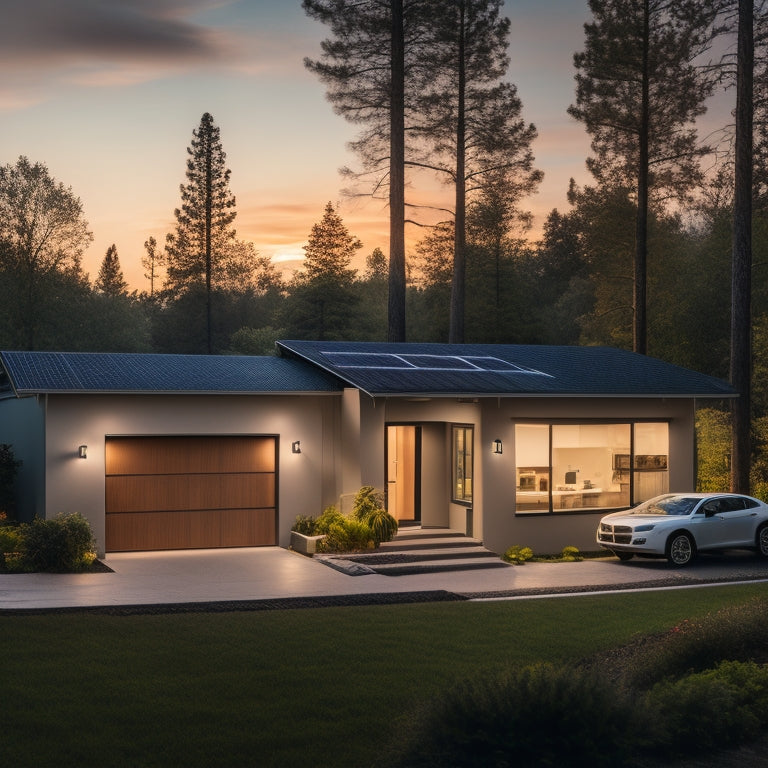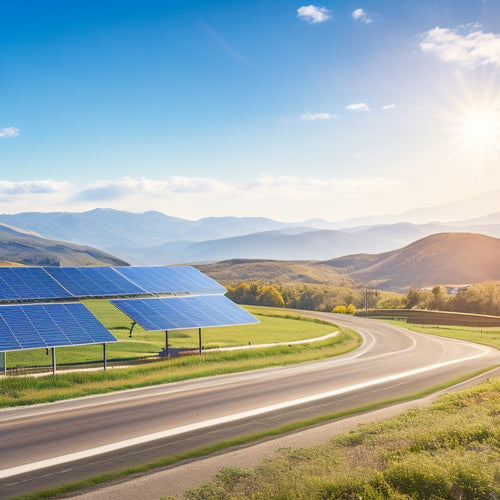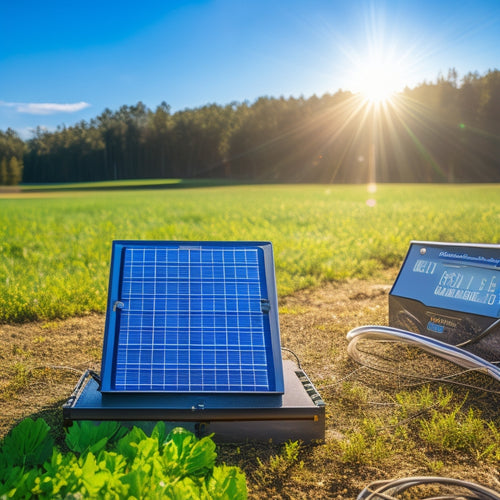
3 Essential Home Backup Energy Systems
Share
You're looking for a reliable energy backup system to maintain power during outages, and you've got three vital options to evaluate. Initially, whole house power backup systems automatically kick in during outages, providing uninterrupted energy supply. Next, renewable energy storage options like solar batteries, lead-acid batteries, and flow batteries offer a range of benefits, from high energy density to low maintenance. Finally, off-grid energy systems utilize solar power and include important components like high-quality solar panels, accurate system sizing, and effective battery management. Now, investigate these options further to find the perfect fit for your energy needs.
Key Takeaways
- Standby generators provide automatic backup power during outages, while portable generators require manual startup, and both need proper installation and maintenance.
- Renewable energy storage options, such as solar batteries, lead-acid batteries, flow batteries, and lithium-ion batteries, offer varying benefits and considerations.
- Whole house power backup systems require energy-efficient appliances and lighting to reduce consumption and lower demands on the backup power source.
- Off-grid energy systems rely on solar panel installation, accurate system sizing, high-quality components, and effective battery management for reliability and energy independence.
- Proper installation, including placing the generator at least 20 feet from the home and hiring a licensed electrician, is crucial for safe and efficient backup power.
Whole House Power Backup
Since a whole house power backup is essential for maintaining uninterrupted power supply during outages, it's important to understand its functionality and benefits.
You'll want to choose the right generator type for your needs, such as a standby generator, which automatically kicks in during an outage, or a portable generator, which requires manual startup.
When selecting a generator, contemplate factors like power output, fuel type, and noise level. It's also necessary to take into account energy-efficient appliances and lighting energy-efficient options to reduce energy consumption and lower overall demands.
Proper installation is also imperative, so be sure to follow installation tips, like placing the generator at least 20 feet away from your home and confirming it's installed by a licensed electrician.
Renewable Energy Storage Options
With the increasing adoption of renewable energy sources like solar and wind power, you're likely considering ways to store excess energy for later use. Renewable energy storage options are vital for a reliable home backup energy system.
| Storage Option | Key Benefits |
|---|---|
| Solar Batteries | High energy density, deep discharge capability, and long lifespan (up to 10 years) |
| Lead-Acid Batteries | Cost-effective, well-established technology, and easy to recycle |
| Flow Batteries | Scalable design, long-duration energy storage, and low maintenance |
| Lithium-Ion Batteries | High energy density, fast charging/discharging, and compact design |
When selecting a renewable energy storage option, consider factors like energy management, cost, and lifespan. A well-designed energy management system guarantees efficient energy distribution and storage. By choosing the right storage option, you can optimize your home backup energy system and reduce your reliance on the grid.
Off-Grid Energy System Essentials
You've selected a suitable renewable energy storage option for your home backup energy system, now it's time to focus on the key components that'll enable you to live off the grid.
A solar panel installation is essential, as it'll convert sunlight into electrical energy. Make certain the installation is designed to meet your energy needs, considering factors like roof size, orientation, and local building codes.
Effective system sizing is also significant, as accurate load calculations can prevent undersizing or oversizing, and selecting high-quality, harmonized components can maximize energy output and system longevity.
Effective battery management is also important, as it'll regulate the charging and discharging of your energy storage system. This includes monitoring battery health, state of charge, and depth of discharge to prevent overcharging or undercharging.
With these essentials in place, you'll be well on your way to achieving energy independence.
Frequently Asked Questions
Can I Install a Backup Energy System Myself?
You can attempt a DIY installation, but consider the safety risks and potential cost savings; a thorough cost analysis and careful equipment selection are essential to guarantee a successful and efficient backup energy system.
Are Backup Energy Systems Covered by Homeowner's Insurance?
You'll want to review your homeowner's insurance policy to see if backup energy systems are covered, considering coverage limits and potential policy exclusions, as insurance providers vary in their approach to covering these systems.
How Often Should I Perform Maintenance on My System?
Imagine a scenario where your system fails during a critical power outage, leaving you in the dark. To avoid this, you should perform maintenance every 3-6 months to verify system longevity, checking battery health, connections, and fluid levels to assure reliable backup power when you need it.
Can I Use a Backup Energy System With a Septic System?
You'll need to guarantee your backup energy system meets septic system requirements, as they can impact each other's performance; check energy system compatibility with your septic system's design, size, and water usage to avoid interference or damage.
Are Backup Energy Systems Suitable for Apartments or Condos?
Savvy seekers of sustainable solutions, you're wondering if backup energy systems are suitable for apartments or condos. While possible, it's essential to evaluate condo bylaws, apartment building codes, and space constraints when exploring apartment energy and condo solutions that meet your unique needs.
Related Posts
-

Is This the Future of Alternative Energy Systems
Yes, alternative energy systems are shaping the future of energy. Innovations in solar and wind technologies are driv...
-

Is Switching to Green Energy Solutions Easy
Switching to green energy solutions isn't just easy; it's also beneficial. You can greatly cut utility costs and enjo...
-

Choosing the Right Solar Power Charge Controller
Choosing the right solar power charge controller is crucial for maximizing energy efficiency and extending battery li...


